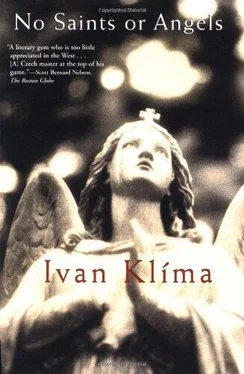Before the end of surgery I call home, but there is no reply. Where has she got to now, that creature who is fawning and stubborn by turns and is almost certainly pulling the wool over my eyes? I'm a gullible fool; it's obvious to everyone, and everyone eventually takes me for a ride. But there's no one I can complain to. We're each of us engineers of our own fate — to a certain extent, at least.
The stonemason's is just by the entrance to the cemetery. The lady behind the counter has an Art Nouveau look, which suits her line of business. She is also good-natured but with a gravity appropriate for dealing with the recently bereaved. She makes a computer record of Dad's name and the details to be inscribed on the headstone. Then she takes a deposit from me and prints me a receipt.
While I'm there I ask about urns and she shows me the five different types they offer, which differ more in price than in appearance. As if it matters what an urn looks like when it's going to be buried in the ground. I choose the cheapest, which is expensive anyway. I don't know what urns used to cost in the past,
but the price is bound to have gone up, like everything else, from the cradle to the grave. People now have to pay for dental treatment. If you have the talent and the determination you can now make enough to afford several urns at the end of your dental career.
'Would you also be interested in a lamp or a vase?'
I'm not interested in a lamp — but what about a vase? I recall the incident from my childhood and how I promised my father I'd buy him two vases; I have only half-fulfilled that promise. And one should keep one's promises, even belatedly.
I take a look at the heavy stone and metal vessels on display. They also have ordinary ceramic vases, the lady at the computer explains, but the massive ones are preferable. The lighter ones can easily fall over in the wind or be knocked over by birds. Thieves are also more likely to steal the ceramic and metal ones. The best thing is to put everything on a chain and padlock, but they don't sell chains here.
I don't know whether any of the vases resembles the one I broke. I've forgotten its shape; I can only recall its colour.
'Do you have a blue one?'
She brings me a vase that is more amethyst than blue, but the colour doesn't matter. Not even the brightest blue will please Dad now. I buy the amethyst vase and thereby fulfil a longstanding promise. A foolish promise and a foolish purchase.
I phone home but again there is no reply. There is a bus terminal nearby; one of those buses could take me to the part of town where my former and now terminally ill husband still lives.
Half an hour later I ring his doorbell. It takes a while before I hear the sound of shuffling footsteps.
The door opens and my nostrils are assailed by the stench of unaired rooms, sweat and urine.
He looks at me, my former, only and last husband, as if he doesn't recognize me. 'It's you, is it?'
'I can go away again if it's not convenient.'
'No, no, I'm glad you've come.' He is visibly moved. He's wearing the dark-blue dressing gown I bought him for Christmas years ago. In those days he still had broad shoulders and muscles; every morning he used to exercise with a chest-expander and go for a run around the walls of the New Jewish Cemetery. Now the dressing grown hangs on him like on a scarecrow. His hair has thinned and is matted into dirty grey tufts. He follows my gaze and says, 'Sorry, I look dreadful.'
The voice whose clear tones used to excite me with their colour and warmth is now thick and lifeless.
'No, you look better than at the hospital.'
He asks me to sit down and he shuffles to the dresser. I notice that the large pendulum clock that hangs alongside the dresser, one of the few things he asked to take from our joint household, has stopped. It shows precisely midday or midnight. I am surprised. He always made sure it kept the right time.
He registers my gaze. 'I stopped it. Its ticking got on my nerves.' He opens the dresser and takes out a bottle of cheap red wine. 'Someone brought me this, but I'm not allowed to drink. I'll open it for you.'
I shake my head. I don't feel like drinking in front of him. 'Have you had supper?'
'I haven't had lunch yet,' he says. 'I've no appetite and I've nothing to eat.'
'Would you like me to cook you something?' I go into the kitchen and open the fridge. There is nothing in it apart from a cube of processed cheese, a roll that has gone hard, and a few raw, shrivelled potatoes.
'I'll get you something from the shop.'
'Stay here. I don't feel like anything anyway.'
I sit down opposite him. 'How do you feel?'
He just shrugs. 'They've given me some tablets, but they make me feel rotten. What about Jana?' he asks.
'She told me she'd been to see you and made you some pancakes.'
'Did she?' He seems surprised. 'Oh, yes, that's right. She was here,' he recalls. 'She's turned into a real beauty.'
I tell him that the beauty will probably fail her exams, that she plays truant and hangs about with a bad crowd, and that she probably smokes cannabis.
He gazes at me wearily and then asks, 'What are you going to do about it?'
Yes — what will I do about it? For a moment the old bitterness wells up in me. That's what he'd always ask. Whenever our little girl ran a temperature, when he selfishly got me pregnant but definitely had no wish to be a father, when our flat was burgled one time, whenever there was a burst pipe in the upstairs neighbour's bathroom, he would ask me the same question: 'What are you going to do about it?' Not what he was going to do, or we were going to do. A modern man, I realized at the time. Latching on to a woman and clinging to her: a little boy at his mummy's breast, who stays there until he grows tired of it and fancies being suckled elsewhere.
I realized it too late, unfortunately.
No, I mustn't be callous. Whatever he was like before, he now sits here on this chair a poor, abandoned human being who suffers and fears the end. How could it have occurred to me to seek his advice or even expect any sign of interest?
I tell him I don't know what I'll do with our adolescent. I'll seek advice from someone who is better informed.
'Drugs. We didn't have that sort of thing when I was still teaching,' he says. 'Apart from smoking in the toilets. But you oughtn't to smoke. Not at home, anyway. You set a poor example.'
Whereas he always set a good example. He didn't smoke, he didn't drink, he did morning exercises, brushed his teeth and he took his shoes off when he came in. All he did was find a mistress and demonstrate to our little girl that deception and desertion are
part of life. 'How do you spend your day?' I ask, in order to switch the conversation back to the only person who still interests him.
'I sit here like this. Sometimes I read for a while. But what's the point? So most of the time I just sit here and wait and listen.'
'Do you listen to music?'
He shakes his head.
'What do you listen to?'
'The murmur of the universe. At night, when the street is free of cars, I can hear time rolling through motionless space. It's not nice. That's one reason why I stopped winding the clock. It was too much of a reminder of how time never stops rolling onwards.'
I don't know whether he is really recounting his own experience or trying to play on my emotions, or whether he is simply repeating something he read somewhere. 'Don't you sleep at night?'
'I sleep on and off, whether it's day or night.' Without looking at me he says, 'I'm scared of falling asleep. It's stupid because I won't escape the moment anyway; but I'd like to be awake.'
Father Kostka mentioned humility and reconciliation at the surgery the other day. I ought to have asked him what he had in mind. Maybe I could have said something comforting to give courage to my ex-husband, who maybe believes that he will outwit death, or even overcome it if he doesn't let it surprise him in his sleep.
Читать дальше












